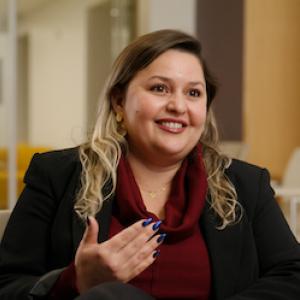Learn how to give students access to high-quality educational and vocational experiences, guide social and emotional development and help with career readiness with a Master of Education (MEd) in School Counseling.
Modality

Program Overview for MEd in School Counseling
Emphasizing the role of the school counselor as a facilitator of educational reform, the program features a variety of career development and experiential learning opportunities, including onsite school guidance counselor training. The degree in School Counseling at Cambridge College is approved by the Massachusetts Department of Elementary and Secondary Education.
This program prepares you to meet the Pre-Master’s Degree education and experience requirements for the Initial School Counseling License (SC) application in the Commonwealth of Massachusetts.
While all required classes are taught remotely, the student's field experience hours must be completed in person at a Massachusetts-based school under the supervision of a School Counselor. However, the coursework for the field experience can be completed via Zoom.
Program Highlights and Learning Outcomes for School Counseling MEd
Our graduates are group workers skilled in developmental guidance and practitioners who know how to help students find their academic niche and achieve their best. They are also effective brokers of educational and community resources, skilled interpreters of assessment tools and valuable consultants to students, parents and staff.
The knowledge and skills you'll develop through the Master’s in School Counseling curriculum include:
- Group counseling, leadership and consulting techniques
- School counseling research and the psychology of learning
- Curriculum frameworks and student testing
- Understanding normal and abnormal intellectual, social and emotional development
- Diagnosis and treatment of learning and behavior disorders
- Strategies for prevention and treatment of substance abuse, physical and sexual abuse, the spectrum of mental illnesses and violence in PreK-12 students
- Post-secondary education and career planning
- Federal, state and municipal laws and regulations related to school counseling
Why Choose Cambridge College for Your MEd
Take the next step in your education and career. The School Counseling program at Cambridge College offers a flexible, affordable master’s degree option designed for working professionals.
- Experiential learning: The master’s in school counseling features extensive on-site, hands-on training experiences via school counseling internship fieldwork and seminar classes following Massachusetts State Standards for School Guidance Counseling.
- Flexible, hybrid schedule: Earn your Master’s degree in School Counseling while balancing work and family time with convenient day, evening and weekend class options that fit the needs of adult learners. Courses are taught in scheduled remote sessions, while field experience hours must be completed in person.
- Experienced faculty: Cambridge College faculty are experienced counseling professionals, accomplished researchers, and accessible teachers who are dedicated to helping you succeed.
- Exceptional value: Rated one of the most affordable four-year private nonprofit colleges in the nation, Cambridge College offers quality education and low tuition.
Learn more about the Counseling programs offered through our School of Education & Counseling.
Watch our recorded information session to explore program details, career paths, and the student experience.

"Many teachers in Cambridge College still work as school counselors in the school currently, so they really know what they're talking about. [The learning is] not just theory, it's real life."
School Counseling MEd Tuition Information
*See curriculum sheet for a breakdown of credits and credit ranges.
Courses
The Master’s in School Counseling at Cambridge College features classes such as:
- Group Work With Children and Adolescents
- Counseling and Consulting Techniques Laboratory
- Perspectives in Cross-Cultural Counseling
- School Counseling Internship Fieldwork and Seminar
Prospective graduate degree students for programs in the School of Education & Counseling must satisfy the following requirements plus any program-specific requirements your program may have.
- Complete and sign the online application.
- Pay the application fee. Pay your $50 ($100 for international students) application fee by the term start date.
- Send official transcripts. Maildirectly to Cambridge College in a sealed, unopened envelope. Learn How to Send Transcripts. Required degrees must be from accredited colleges or universities.
- Master's and most graduate certificate programs require an earned bachelor's degree.
- Post-master's certificates and CAGS require an earned master's degree.
- International transcripts must be translated and evaluated by an approved agency. See all international student requirements
- Send your résumé and work experience. Send your resume that details your education and work experience, including how they pertain to your career goals. If your SEC program has a work experience requirement, it will be listed in the Program-Specific Requirements section below.
- Submit your personal statement. Write a 500-word, typed, double-spaced essay describing your professional experience, goals and objectives for graduate study. How do you expect your graduate studies to enhance your future career?
- Include two professional recommendations (not required for fully online programs). These should address your professional character and ability to perform graduate work. Download Applicant Recommendation Form
- Interview (required for some programs). If your program requires an interview, it will be listed in the Program-Specific Requirements section below.
- Satisfy Health Insurance & Immunization requirements. (Massachusetts only). These are required only for graduate students taking six or more credits per term in Massachusetts through on-campus or hybrid classes. Health insurance may be waived.
Teacher Licensure Program Requirements
In addition to the requirements listed above, our Teacher Licensure Programs have these additional requirements:
- Earned bachelor's degree with 3.0 or higher GPA.
- MA Educator Documentation from the Massachusetts Dept. of Elementary and Secondary Education (DESE) website. Keep copies of all documents submitted and, upon admission, post in your electronic portfolio:
- Massachusetts Educator Personnel ID (MEPID number)
- MTEL Communication & Literacy Test, successfully completed.
Required if completed:
- Massachusetts preliminary license, if held
- Sheltered English Instruction requirement
- Fingerprinting and Criminal Offender Record Information
Applicants who do not initially meet all requirements (e.g. GPA of 3.0 or MTEL) for admission into their chosen licensure program must enroll in the corresponding non-licensure degree option. Students who achieve a 3.0 GPA upon completion of the first three SEC courses, pass the MTELs, and now meet all requirements, may request a change of program.
Disclosures: For all Licensure Programs
- Licensure requirements are subject to change per Massachusetts regulations. All Cambridge College licensure programs are based on current regulations.
- All candidates admitted for licensure programs must successfully complete the program in its entirety.
- All requirements at the time of program completion must be finalized prior to seeking Massachusetts endorsement for licensure purposes.
- If you have any licensure questions, please speak to your program chair.
Careers in School Counseling
School counselors and school counseling programs have a positive impact on K-12 student outcomes. However, there is a growing need for qualified school counselors. Across all schools, the average student-to-school-counselor ratio is 408 to 1, which is significantly lower than the 250 to 1 ratio recommended by the American School Counselor Association.1
According to the Bureau of Labor Statistics, school counselors nationwide earn an average of $60,140 per year.2 Massachusetts is also one of the top five paying states for educational, guidance and career counselors and advisors, with individuals earning an average of $76,860 annually.3
$60,140
Median annual salary for school and career counselors and advisors in the U.S.2
5%
National job growth expected for school and career counselors and advisors from 2022-323
1 American School Counselor Association, School Counselor Roles & Ratios, https://www.schoolcounselor.org/About-School-Counseling/School-Counselor-Roles-Ratios (visited December 29, 2023).
2 Bureau of Labor Statistics, U.S. Department of Labor, Occupational Outlook Handbook, School and Career Counselors and Advisors, https://www.bls.gov/ooh/community-and-social-service/school-and-career-counselors.htm (visited December 28, 2023).
3 Bureau of Labor Statistics, U.S. Department of Labor, Occupational Outlook Handbook, 21-1012 Educational, Guidance, and Career Counselors and Advisors, https://www.bls.gov/oes/current/oes211012.htm#st (visited December 29, 2023).
Jobs in School Counseling
Most graduates go on to careers as licensed school guidance counselors in public schools. Other career options you might pursue with a Master’s degree in School Counseling include:
- Working with community health organizations
- Going into private practice
- Pursuing a doctoral degree in counseling or a related mental health field
